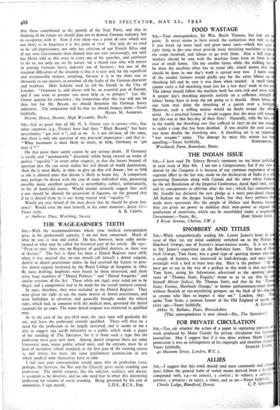THE WAGE-EARNER'S TEETH SIR, -With the recommendations which your medical correspondent
gives in his profession'al capacity, I am not here concerned. Much of what he says is true and useful. He has, however, been sadly misin- formed in what may be called the historical part of his article. He says: "Prior to 1921 there was no Register of qualified dentists, as there was of doctors." The fact is there has been a Dental Register since 1878, when it was enacted that no one should call himself a dental surgeon, dentist or dental practitioner unless he had received the licence to prac- tise dental surgery instituted by the Royal College of Surgeons in 1865. By loose drafting, loopholes were found by those interested, and there arose large numbers of "Dental Parlours" and "Dental Surgeries" and similar evasions of the Act. These while not legal, were ruled not to be illegal, and a compromise had to be made for the vested interests created.
In 1921, therefore, they were included in the Dental Register. They were given the right to use the name dentist or dental practitioner, and were forbidden to advertise, and generally brought under the ethical rules, which had, in common with the medical men, governed the dental surgeons for 40 years. The name dental surgeon was restricted to qualified men.
As in the case of the pre-1878 men, the 1921 men will gradually die out, and leave the profession entirely qualified. There will thus be a need for the profession to be largely recruited, and it seems to me a pity to suggest any social inferiority to a public which reads a paper of the standing of The Spectator, for it is from such a type that the profession must gain new men. Among dental sargeons there are some University men, many public school men, and the entrants must be at least of secondary school standard, as the first part of the training course is, and always has been, the same preliminary examinadon in arts which medical men themselves have to take.
I feel sure your correspondent would agree that no profession (save, perhaps, he Services, the Bar and the Church) gives social standing qua profession. The dental surgeon, like the solicitor, architect and doctor, is accepted as he deserves, and no one need fear to enter this interesting profession for reasons of social standing. Being governed by the rule of






















 Previous page
Previous page